Science As a Full Body Experience: Brian Greene On 2019 World Science Festival
The festival runs from May 22 to June 2 in New York City.
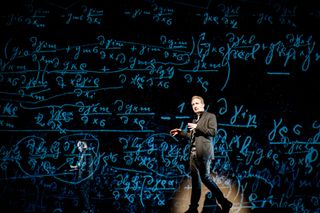
The 2019 World Science Festival kicks off this week in New York City!
Space.com spoke with theoretical physicist and science communicator Brian Greene, who co-founded the event in 2008 with his wife, journalist Tracy Day. The series is designed, according to Greene, to appeal to a wide range of audiences, both local and nationwide. The festival's opening-night event, ''Light Falls,' (scheduled for tonight, May 22) will also air on PBS May 29, the 100th anniversary of the famous confirmation of Albert Einstein's theory of general relativity.
The festival runs from May 22 to June 1 this year, and content from past panels and concerts is available to watch online.
Related: Astronaut Sunita Williams Reflects on Life in Space at NYC Space & Science Festival
Space.com: You have experience as a professor, as a writer and as a television host. How is the World Science Festival different from these other mediums of communication?
Brian Greene: Well, it's kind of a blending of all of them, in some ways. Each one yields a different kind of experience. It's obviously a live experience — it's unscripted, it's spontaneous — in which the audience gets to hear from the scientists that are right at the cutting edge of research. At the same time, the festival producers do a lot of work to ensure that there is a road map for the program that will be intriguing [and] exciting [and] cover difficult material in a way that's accessible and, in the end, give[s] the audience a real, exciting look at the frontier of thinking.
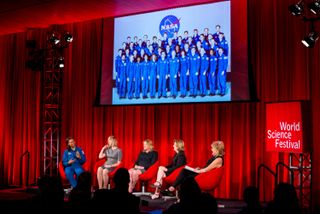
Space.com: What could different audiences glean from the same events? I imagine you have scientists attending your events, and you may also have people who work in other professions.
Get the Space.com Newsletter
Breaking space news, the latest updates on rocket launches, skywatching events and more!
Greene: Yeah, it is a really quite broad audience. The goal is to make the programs accessible to someone that's interested but doesn't have any background in the subject. But we don't want the programs to not be sufficiently new and exciting to someone who, perhaps, has more of a background in the subject. And we do that by covering background material, usually through well-produced pieces that we integrate into the program, so that we don't spend 20 or 30 minutes covering basic material that may not be understandable to the general person who has not encountered the ideas before.
Rather, through the medium of film, in 3 to 5 minutes, you can really grasp the basics of genomics, you know, the very basic ideas of cosmology, of the multiverse. So, these difficult ideas can really be understood at a sufficiently fine level to then understand the conversation that happens on the [stage].
Space.com: The World Science Festival includes many different kinds of events. Can you talk a little bit about the different formats?
Greene: We have quite a range of formats … we open with a high-end, theatrical piece that will also be broadcast on PBS. It's a piece that has actors, [a] script, and it's got an original score and highly produced visuals, so that's sort of one end of the spectrum.
And then we also have programs for kids, where kids get together with scientists. That gives them a sense of what it's like to research, be that in biology or be that in neuroscience, so that the kids can really get a feel for that. My kids have done those programs, and they are really incredibly enriching.
And then you have programs where it's more free-form and debate, discussion on stage between leading scientists. Those are the ''Big Ideas'' programs, [which] also come in a variety of formats. Some [are on] a larger stage and for a more broad conversation, and some of them are on more intimate stages, allowing the audiences to kind of get in on the conversation.
And then there are our public, outdoor events, which are generally free. We have a stargazing event [at] Brooklyn Bridge Park. We have ''City of Science,'' which is a partly outdoor, partly indoor extravaganza for the festival in the Washington Square Park area where [there will be] all sorts of hands-on undertakings for kids and families and adults. So, it's a wide range of experiences.
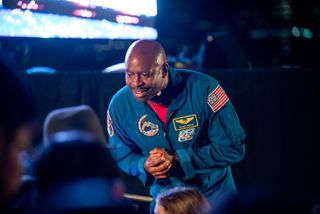
Space.com: There are all of these artistic elements in the festival and in other science communication work that you've done. You've brought up the short explainer film, and you're talking about starting the festival off with — not to sound corny — a Big Bang. Is there something that you've gleaned from performing arts that's been helpful for communicating science?
Greene: Yeah, I mean, part of the philosophy of the festival from the onset, when Tracy [Day] and I started it, was to not have science be cordoned off on the outskirts of culture, but rather, to create an event that would embrace science as a part of culture. And to do that, science needs to be brought together with music and film and dance and theater in order that we no longer view it as something that's just done by the folks in the white coats in the ivory tower. … When you encounter science in this different way … they're not just thinking about it, they're not just studying for an exam. They are actually embracing it as part of what makes us human. And that's the reason why we incorporate as much of the performing arts as makes sense in a given festival.
Space.com: Was that part of the festival already there in the early stages, or developed later on?
Greene: Well, it's definitely been there since day one, but just at different levels of production. I think we did our first major original piece with [composer] Philip Glass back in 2010: ''Icarus at the Edge of Time,'' [about] a boy heading to the edge of a black hole. And Philip Glass wrote an original orchestral score. I wrote the words to the piece, and two filmmakers, AL and AL [Al Holmes and Al Taylor] created a beautiful film, and we premiered that at Lincoln Center with a full orchestra and [actor] John Lithgow doing the narration on stage live.
And, you know, from that moment forward, it became so clear that audiences have a new manner of engaging with difficult ideas, if — perhaps I can say it this way — if it's a more full-body experience as opposed to just a cerebral experience … you have a fuller engagement with the ideas, and that's something that we have pursued ever since.
Related: Eureka! Scientists Photograph a Black Hole for the 1st Time
Space.com: Can you elaborate a little bit more on what ''engagement'' means to you?
Greene: Well, it's focused attention, where you care about the ideas that you're encountering, and that is not often the case with science in the classroom. You know, I see it with my own kids and I remember it as well from when I was a little kid. If the charge is to memorize qualities of the cell or just to be able to solve mathematical equations, without really having a sense of it mattering in a deep, visceral way, then it's just a collection of ideas that rattle around your brain.
But engagement is when those ideas lock into a matrix of meaning, where you recognize that it matters to know how the world works, it matters to know where the universe came from, to understand where life came from. It helps us understand ourselves. And when you can instill that sensibility, then the encounter with these ideas is completely different. And that's what I mean by full engagement.
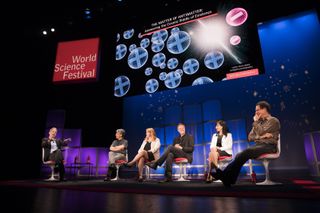
Space.com: The last few years have been mind-blowing for the field of astronomy. Maybe you can elaborate on these recent discoveries, like your experience when you saw the first image of a black hole and your feelings about the new field of gravitational wave astronomy.
Greene: It's been an amazing couple of years. You know, the black hole image, I and others, too, have been eagerly awaiting it. I've been in sporadic contact with [Event Horizon Telescope director] Shep Doeleman, so I knew that it was happening. And he told me that it was going to be really cool. And indeed, you know, to finally see an image of something that we theorists have been working on and thinking about for decades was one of those amazing moments.
And similarly, for gravitational waves, if not more so, many of us were skeptical that gravitational waves would ever be detected. We weren't skeptical about ultimately getting an image of a black hole, but we were skeptical about the capacity, the technology, to detect these ripples in the fabric of space-time.
When that result appeared [and] when it was finally confirmed … that was a watershed moment both for revealing the power of scientists to do the absolutely unimaginable, to detect a twitch in the detector that, you know, is less than the radius of an atom. That's just insane!
And at the same time, it opens a whole new field of astronomy … and gives us a whole new window on reality.
Space.com: What is your big goal for the 2019 World Science Festival?
Greene: Well, the big goal every year is to excite the public about what's happening at the forefront, but this year is a particularly interesting one because it's a milestone in two ways.
It's the 50th anniversary of the moon landing, and it's the 100th anniversary of the confirmation of the general theory of relativity. A big goal this year is to get people excited about these two critical moments in, you know, human exploration and human intellectual history. And that's why we're not just having … the live events in New York City … we have this national public television broadcast of one of our premiere programs, ''Light Falls,'' about the discovery and confirmation of general relativity. It opens the festival on May 22, but then it'll be broadcast on May 29 … which happens to be the 100th anniversary of the confirmation of general relativity to the very day! So, it's sort of a nice confluence of all these milestones coming together.
This interview was edited for length.
- 'Black Hole Hunters' Shows Epic Chase to Capture First Images
- Whoa! Watch This Fireball Blaze Over a Foo Fighters Concert in the Netherlands
- World Science Festival Kicks Off in NYC with Black Holes, Aliens and More
Follow Doris Elin Salazar on Twitter @salazar_elin. Follow us on Twitter @Spacedotcom and on Facebook.
Join our Space Forums to keep talking space on the latest missions, night sky and more! And if you have a news tip, correction or comment, let us know at: community@space.com.
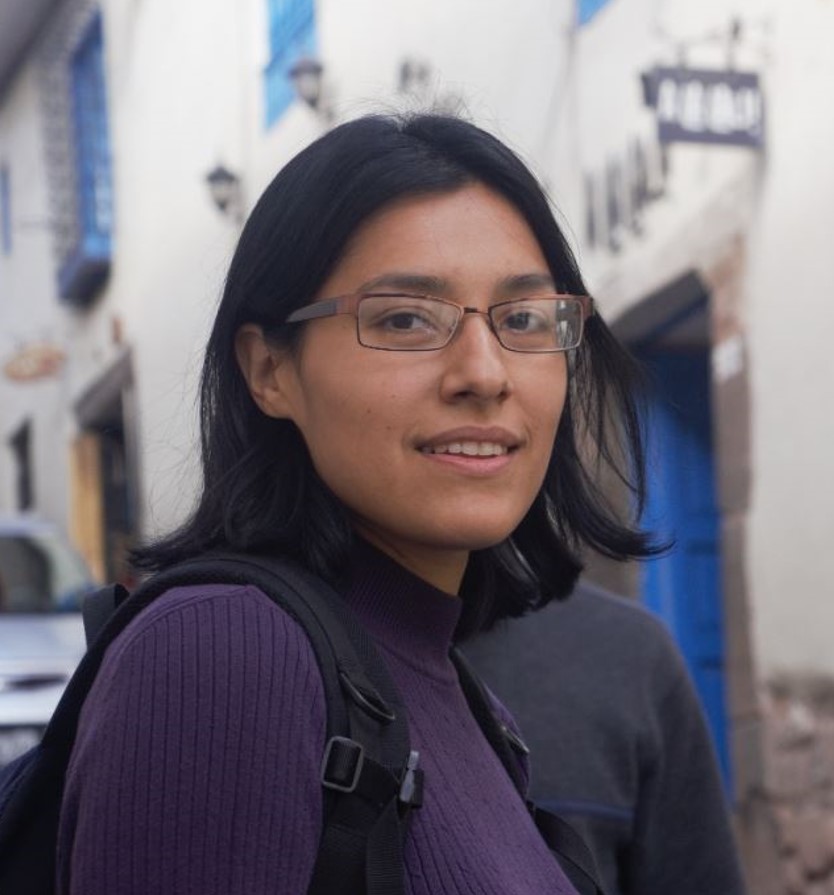
Doris is a science journalist and Space.com contributor. She received a B.A. in Sociology and Communications at Fordham University in New York City. Her first work was published in collaboration with London Mining Network, where her love of science writing was born. Her passion for astronomy started as a kid when she helped her sister build a model solar system in the Bronx. She got her first shot at astronomy writing as a Space.com editorial intern and continues to write about all things cosmic for the website. Doris has also written about microscopic plant life for Scientific American’s website and about whale calls for their print magazine. She has also written about ancient humans for Inverse, with stories ranging from how to recreate Pompeii’s cuisine to how to map the Polynesian expansion through genomics. She currently shares her home with two rabbits. Follow her on twitter at @salazar_elin.
